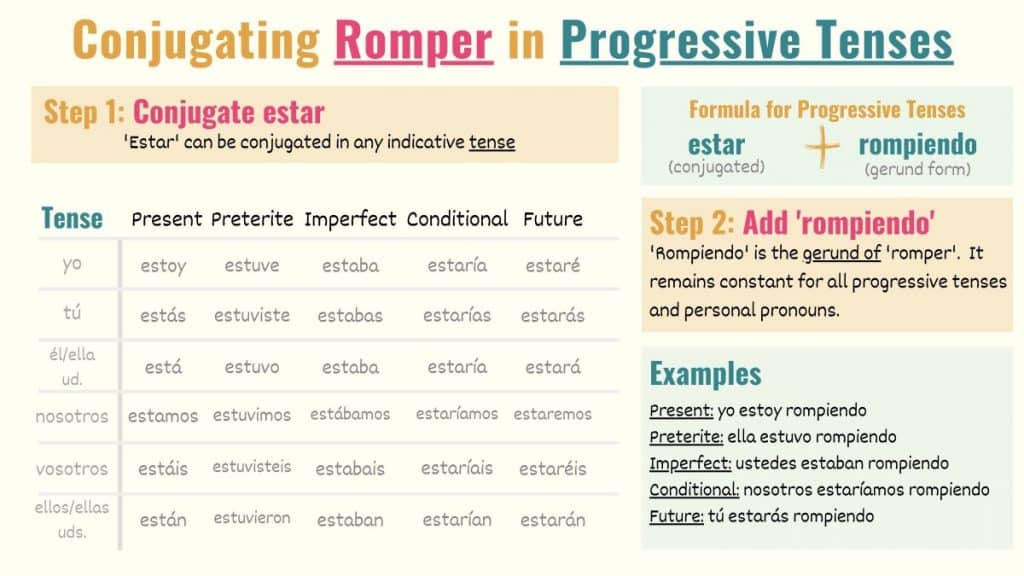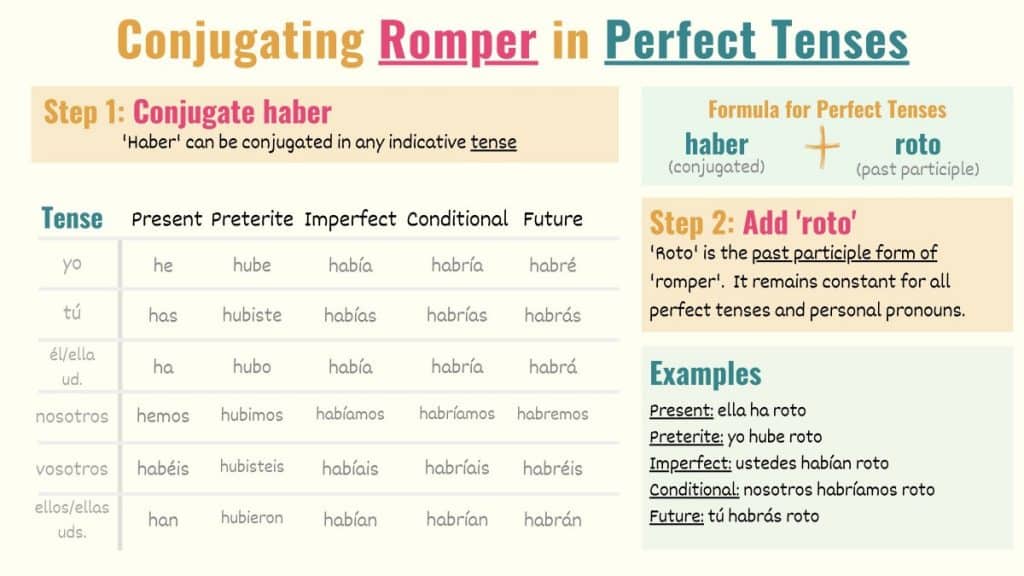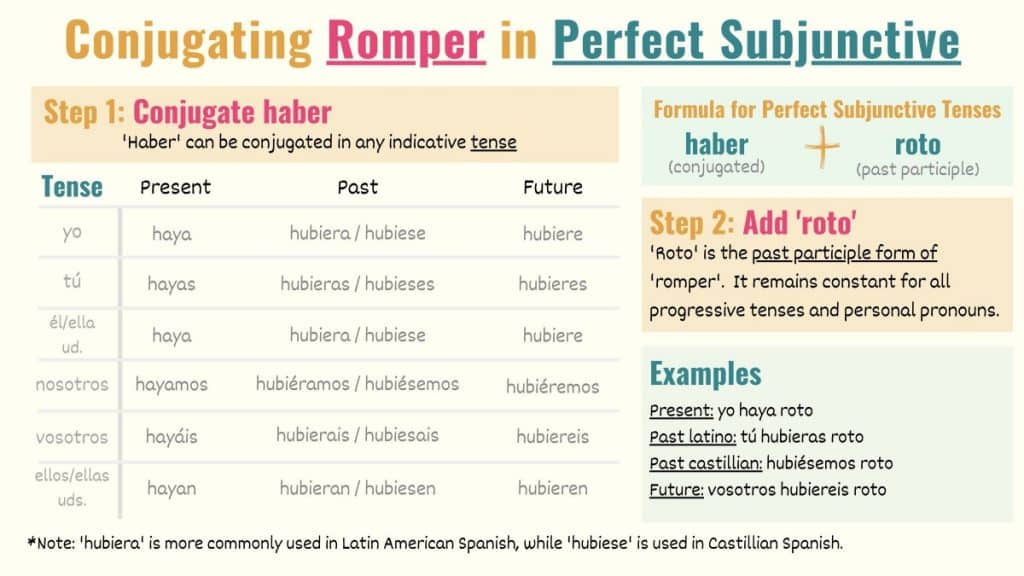In this short guide, we will cover the following topics for ‘romper’ in Spanish:
- What does ‘Romper’ mean?
- ‘Romper’ Conjugations
- How to Use ‘Romper’ in Spanish
- Expressions & Idioms with ‘Romper’
- Synonyms of ‘Romper’ in Spanish
What does ‘Romper’ mean?
In Spanish, ‘romper’ is used to describe that an object was shattered or broken into pieces. It can also express the end of a romantic relationship. Although it is the direct translation of ‘to break‘, depending on the object that you are referring to, ‘romper’ can have multiple variations.
- When talking about destroying, breaking or shattering objects, ‘romper’ means ‘to break, ‘to rip’ or ‘to tear’.
- In Spanish, ‘romper’ can also be used to express that a body part was broken. In this case, it is translated as ‘to break’, ‘to smash’, ‘to cut’ or ‘to bust’.
- If used to describe that a romantic relationship has come to an end, ‘romper’ means ‘to break up’.
‘Romper’ Conjugations
In Spanish, ‘romper’ is a regular verb. As a result, the stem ‘romp’ will not change when conjugating, with the exception of the future and conditional tenses, whereas the stem is the verb in its infinitive form.
Indicative
Present tense conjugation
| Person | Conjugation | Translation |
|---|---|---|
| Yo | Rompo | I break |
| Tú | Rompes | You break |
| Él / Ella / Usted | Rompe | He/She break |
| Nosotros | Rompemos | We break |
| Vosotros | Rompéis | You break |
| Ustedes / Ellos / Ellas | Rompen | They/You break |
Preterite tense conjugation
| Person | Conjugation | Translation |
|---|---|---|
| Yo | Rompí | I broke |
| Tú | Rompiste | You broke |
| Él / Ella / Usted | Rompió | He/She broke |
| Nosotros | Rompimos | We broke |
| Vosotros | Rompisteis | You broke |
| Ustedes / Ellos / Ellas | Rompieron | They/You broke |
Imperfect tense conjugation
| Person | Conjugation | Translation |
|---|---|---|
| Yo | Rompía | I broke |
| Tú | Rompías | You broke |
| Él / Ella / Usted | Rompía | He/She broke |
| Nosotros | Rompíamos | We broke |
| Vosotros | Rompíais | You broke |
| Ustedes / Ellos / Ellas | Rompían | They/You broke |
Future tense conjugation
Keep in mind that for the future and conditional tense you’ll need to work with the verb as a whole.
| Person | Conjugation | Translation |
|---|---|---|
| Yo | Romperé | I will break |
| Tú | Romperás | You will break |
| Él / Ella / Usted | Romperá | He/She will break |
| Nosotros | Romperemos | We will break |
| Vosotros | Romperéis | You will break |
| Ustedes / Ellos / Ellas | Romperán | They/You will break |
Conditional tense conjugation
| Person | Conjugation | Translation |
|---|---|---|
| Yo | Rompería | I would break |
| Tú | Romperías | You would break |
| Él / Ella / Usted | Rompería | He/She would break |
| Nosotros | Romperíamos | We would break |
| Vosotros | Romperíais | You would break |
| Ustedes / Ellos / Ellas | Romperían | They/You would break |
Progressive Tenses

Perdón, tengo que colgar, mi hija está rompiendo los vasos.
Sorry, I have to hang up, my daughter is breaking all the cups.
¿Por qué estabas rompiendo el pantalón de tu hermana?
Why were you ripping your sister’s jeans?
Perfect Tenses

Michael Phelps ha roto un nuevo récord mundial en los Juegos Olímpicos.
Michael Phelps has broken a new world record at the Olympics.
Cuando me caí de las escaleras, pensé que me había roto una pierna.
When I fell down the stairs, I thought I had broken my leg.
Take Note: As mentioned above, ‘romper’ is a regular verb, with the exception of its past participle form.
Romper Subjunctive Conjugations
Present subjunctive conjugation
| Person | Conjugation | Translation |
|---|---|---|
| Yo | Rompa | To break |
| Tú | Rompas | To break |
| Él / Ella / Usted | Rompa | To break |
| Nosotros | Rompamos | To break |
| Vosotros | Rompáis | To break |
| Ustedes / Ellos / Ellas | Rompan | To break |
Imperfect subjunctive conjugations
| Person | Conjugation | Translation |
|---|---|---|
| Yo | Rompiera / Rompiese | I broke |
| Tú | Rompieras / Rompieses | You broke |
| Él / Ella / Usted | Rompiera / Rompiese | He/She broke |
| Nosotros | Rompiéramos / Rompiésemos | We broke |
| Vosotros | Rompierais / Rompieseis | You broke |
| Ustedes / Ellos / Ellas | Rompieran / Rompieses | They/You broke |
Perfect subjunctive

No puedo creer que hayas roto con David, parecían perfectos.
I can’t believe you broke up with David, you guys seemed perfect for each other.
Si no hubieras roto el jarrón de la abuela, no estaríamos en problemas.
If you hadn’t broken Grandma’s vase, we wouldn’t be in trouble.
Imperative
Imperative conjugation
The stem for the imperative conjugation is ‘romp’, however, to conjugate this verb in its negative imperative form, tú and vosotros follow the present subjunctive conjugation.
| Person | Conjugation | Translation |
|---|---|---|
| Tú | Rompe | Break |
| Nosotros | Rompamos | Let’s break |
| Vosotros | Romped | Break |
| Ustedes | Rompan | Break |
[‘Romper’ imperative] + [complement]
Rompe con tu novio si no estás feliz con la relación.
Break up with your boyfriend if you are not happy in the relationship.
No + [‘romper’ in present subjunctive] + [complement]
Ten cuidado, no rompas nada.
Be careful, don’t break anything.
How to Use ‘Romper’ in Spanish with Examples
There are three main ways in which the verb ‘romper’ is used in Spanish. The sections below will help you understand in which contexts you can use this verb and what phrase structures to follow.
- Talking about breaking objects
- To describe injuries
- To talk about ending a romantic relationship
Talking about breaking objects
When talking about material things, ‘romper’ means ‘to break’. However, the translation could change a little bit depending on the characteristics of the object. For example, when talking about clothing or paper, it can be translated as ‘to rip’ or ‘to tear’.
[‘Romper’ conjugated] + [complement]
Mi hermano rompió mi taza favorita.
My brother broke my favorite mug.
Eres muy descuidado, rompes todo lo que tocas.
You are very careless, you break everything you touch.
Los gatos rompieron las cortinas.
The cats tore the curtains.
As mentioned at the beginning of this article, ‘romper’ can also be applied to immaterial things in a figurative sense. This way of using ‘romper’ follows the same phrase structure shown above.
[‘Romper’ conjugated] + [complement]
Elizabeth rompió su promesa.
Elizabeth broke her promise.
No me gusta jugar contigo, siempre rompes las reglas.
I don’t like playing games with you, you always break the rules.
To describe injuries
‘Romper’ can also be used to talk about body parts, and as a result, it is almost always used to describe that someone broke a bone. In this case, you’ll need to use ‘romper’ as a pronominal verb by adding a reflexive pronoun.
(Noun) + [Indirect pronoun] + [‘romper’ conjugated] + [complement]
Julia se rompió la mano jugando tenis.
Julia broke her hand playing tennis.
¡Ayuda! Creo que me rompí la pierna.
Help! I think I broke my leg.
El balón te rompió la nariz, vas a necesitar cirugía.
The ball broke your nose, you’re gonna need surgery.
Take Note: In some cases, you use ‘romper’ with this meaning to express that another person broke or cut someone’s body part. Therefore, in this situation, you’ll use an indirect pronoun.
Saúl le rompió el labio a mi hermano.
Saul cut my brother’s lip.
To talk about ending a romantic relationship
When talking about a relationship that has ended, the verb ‘romper’ can be translated as ‘to break up’. For this situation, you’ll need to add the preposition ‘con’ after ‘romper’.
[‘Romper’ conjugated] + [con] + [noun]
¿Escuchaste que Gaby rompió con Daniel?
Did you hear that Gaby broke up with Daniel?
Estoy pensando en romper con mi novia.
I’m thinking about breaking up with my girlfriend.
¿Romperías con tu novio si te engañara?
Would you break up with your boyfriend if he cheated on you?
Romper Expressions & Idioms
There are some expressions that contain this verb and are frequently used in daily conversations. Knowing them will help you expand your vocabulary and develop your conversational skills.
No romper ni un plato is an expression describing someone that is very innocent and it’s frequently used in a sarcastic way. A similar expression in English could be ‘never hurt a fly’.
Romper la cara can be directly translated as ‘to break the face’. This expression is used as a threat, it warns someone that you’re going to hit them.
Romper el hielo means ‘to break the ice’. It’s used to describe someone easing the tension and creating a nice environment.
Romper a llorar describes a person that suddenly starts crying. It means ‘to burst into tears’.
Synonyms of ‘Romper’ in Spanish
Quebrar translates as ‘to break’ or ‘to crack’.
Terminar, in the context of a romantic relationship, means ‘to break up’.
Cortar is also used to talk about ending a relationship in more informal situations.





